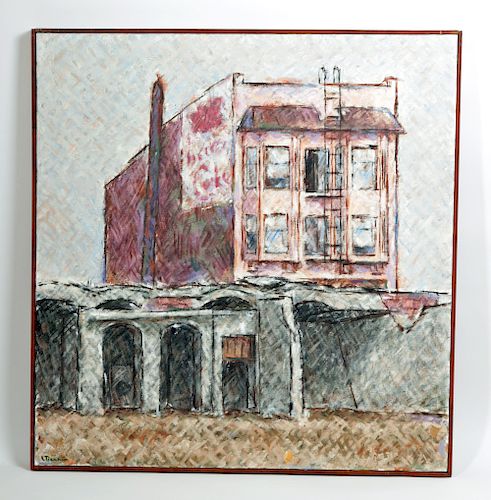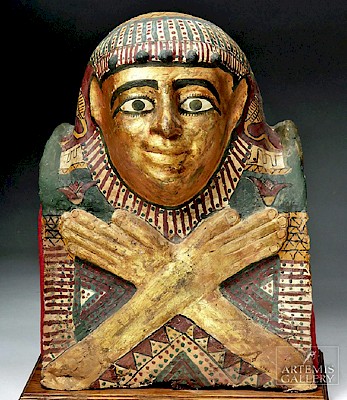L. Dennis Painting "Small Hotel Above Demolition" 1977
Lot 108c
About Seller
Artemis Fine Arts
686 S Taylor Ave, Ste 106
Louisville, CO 80027
United States
Selling antiquities, ancient and ethnographic art online since 1993, Artemis Gallery specializes in Classical Antiquities (Egyptian, Greek, Roman, Near Eastern), Asian, Pre-Columbian, African / Tribal / Oceanographic art. Our extensive inventory includes pottery, stone, metal, wood, glass and textil...Read more
Categories
Estimate:
$2,500 - $3,750
Absentee vs Live bid
Two ways to bid:
- Leave a max absentee bid and the platform will bid on your behalf up to your maximum bid during the live auction.
- Bid live during the auction and your bids will be submitted real-time to the auctioneer.
Bid Increments
| Price | Bid Increment |
|---|---|
| $0 | $25 |
| $300 | $50 |
| $1,000 | $100 |
| $2,000 | $250 |
| $5,000 | $500 |
| $10,000 | $1,000 |
| $20,000 | $2,500 |
| $50,000 | $5,000 |
| $100,000 | $10,000 |
| $200,000 | $20,000 |
About Auction
By Artemis Fine Arts
Jun 20, 2018
Set Reminder
2018-06-20 10:00:00
2018-06-20 10:00:00
America/New_York
Bidsquare
Bidsquare : DAY 1 | Antiquities, Asian, Russian, Fine Art
https://www.bidsquare.com/auctions/artemis-gallery/day-1-antiquities-asian-russian-fine-art-3276
Day 1 of an important 2-day auction featuring exceptional art from around the world Artemis Fine Arts info@artemisgallery.com
Day 1 of an important 2-day auction featuring exceptional art from around the world Artemis Fine Arts info@artemisgallery.com
- Lot Description
Lockwood Dennis (American, 1937-2012), "Small Hotel (Above Demolition)," oil on canvas, 1977. Signed on lower left. One aspect of Lockwood Dennis' genius was that whether he was presenting natural landscapes or industrial environs like this example, he had the uncanny ability to capture a quality of wonder about the place and the immediacy of a moment. In his words, "The important thing for me is making a space you can move through. I use places that I find exciting that way. The hills of Africa, Fort Worden, San Francisco, Onomichi; and industrial sites, all of which remind me of where I grew up in Portland. It's about maintaining the mystery of the unexplored." Size: 36" L x 34" W (91.4 cm x 86.4 cm); 36.125" L x 34.75" W (91.8 cm x 88.3 cm) including frameLockwood Dennis was driven to paint throughout his 45 year career. Although this medium posed the artist's greatest challenge, painting was the most personal and rewarding artistic endeavor for Dennis. Each canvas reveals new aspects about him as a person - his approaches to life, the environment, and art. During the early years, Lockwood was most influenced by the works of Post-Impressionist pioneers of early Modernism such as Cezanne and Matisse. As Lockwood evolved, he developed a graphic style that was informed by the simplified imagery he created for his woodblock prints. In several instances, the subject and image for his paintings and prints are shared. Lockwood Dennis paintings have been collected by the following museums and organizations: Microsoft Corporation, Redmond, Washington; Seattle Art Commission, Seattle, Washington; Hallie Ford Museum of Art, Salem, Oregon; Tacoma Art Museum, Tacoma, Washington; Swedish Medical Center Foundation, Seattle, Washington; Museum of History and Industry, Seattle, Washington; Jefferson Museum of Art and History, Port Townsend, Washington; Whitman College, Walla Walla, Washington; Museum of Northwest Art, La Conner, Washington; Clallam County Historical Society, Port Angeles, Washington; Bainbridge Island Art Museum, Winslow, Washington; US Library of Congress, Washington, DC; US State Department, Washington, DC.Lockwood Dennis was quite eloquent and insightful when asked about his art. The following is an excerpt from the "On Impetus" section of his "Philosophical Musings on Painting": " The impetus to paint is always an experience - a specific place, weather, ordinary things remembered. A celebration of just being here, experiencing the world. The experience itself is somehow lost in the process, and, anyway, its not intended that it should be conveyed. The result is a picture animated by that experience.Dennis continues, "A painting starts with an exuberance. It's good to be alive. The work is a wonderful place. The feeling seems to cover everything, but it relates especially to past experiences, beginning further back than I can remember. It becomes specific in associations with past experiences: Portland, Eastern Washington, Africa; but not with an exact description. The memory of a precise place and time - a moment of past reality is too terrible to bear, there is such a sense of loss, of things gone forever. So it is a present experience, based on the past. And perhaps the cartoon character adds the levity to remove it from the past, or "animate" it in the present."The following is an excerpt from Lockwood's public lecture at the Northwind Art Center in Port Townsend, Washington (April 2012): "For me, my painting began with trying to recall my Peace Corp trip to Africa. We were living in Wapato (Eastern Washington), so I painted our surroundings there in much the same way as Africa. I first painted Port Townsend when some friends invited us to house sit for them and introduced us to many good friends here. When we moved to Port Townsend in 1975, we were living at Fort Worden and I painted from sketches of the gun emplacement bunkers and cliffs. I did a lot of water color paintings with artist Bill Nelson around town and out on the coast (La Push). I used the lithography printing studio of J. Albers to produce 245 editions. And then friend and University of Washington professor Michael Spafford got me started on woodblock prints which I continued to do after we move to our current house in 1990. I did 385 editions of 20 or more each. This changed the paintings a lot, for better or worse. The important thing for me is making a space you can move through. I use places that I find exciting that way. The hills of Africa, Fort Worden, San Francisco, Onomichi; and industrial sites, all of which remind me of where I grew up in Portland. It's about maintaining the mystery of the unexplored.In the paintings, I work around a center to which everything is related. My wife showed me this in a Monet lily pond on our first date (1960). And I work with layers, based on Cezanne. The subject of my master's of art thesis was about how to conceptualize space in a flat picture with linguistic theory." Provenance: Lockwood Dennis Art Estate, Boulder, Colorado, USA; Lockwood Dennis works are now part of the permanent collection at the U.S. Library of Congress in Washington, D.C. Among the highlights of his career, was an exhibition at the Jackson Street Gallery in Seattle entitled,Painting in excellent condition. Signed on lower left. A few tiny scuffs to upper left of front facing edge of frame, very minor and otherwise frame is in excellent condition. Title, date, inventory number, and signature handwritten on verso by the artist. Wired for suspension.
Condition
- Shipping Info
-
All shipping is handled in-house for your convenience. Your invoice from Artemis Gallery will include shipping calculation instructions. If in doubt, please inquire BEFORE bidding for estimated shipping costs for individual items.
-
- Buyer's Premium



 EUR
EUR CAD
CAD AUD
AUD GBP
GBP MXN
MXN HKD
HKD CNY
CNY MYR
MYR SEK
SEK SGD
SGD CHF
CHF THB
THB


















